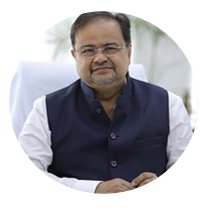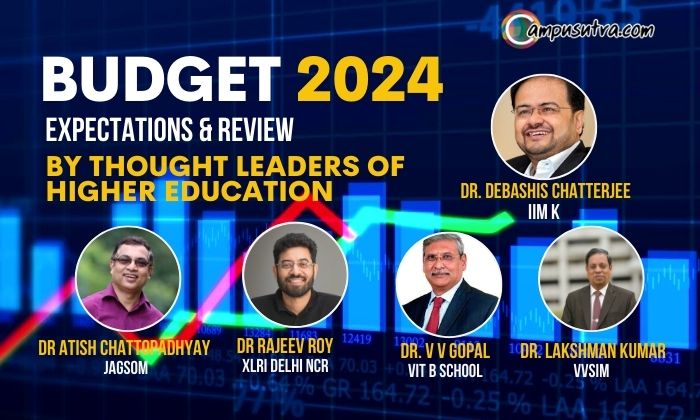The Interim Budget 2024, which was presented by Hon FM Ms Nirmala Sitharaman as her record sixth consecutive budget, highlighted India as the fastest growing major economy in the World, aiming to become the World’s Third largest economy with a $5 trillion GDP.
Suchandra from Campusutra, with her economics background (M.Sc in Eco & MBA in Fin & HR) deciphers the budget for us and also shares what few of the Eminent leaders from academia have to say.
Interim Budget 2024 for the Education Sector and the HEI’s in particular did not have much today. It is anticipated a 10% increment in Education and Literacy Fund Allocation focussing primarily on “Skill India Programmes” in the Central Govt’s July 2024 Budget. The Budgetary Allocation for Education and Literacy saw a formidable increase in last year’s Union Budget (2023 -2024).
- The Interim Budget highlighted Rs 1 Lakh Crore Corpus Fund, for Research & innovation and tax relief for startups – which is expected to help Ed Tech Startups and Organisation/ Institutions focusing on Digital Teaching and Learning Resources.
- Skill India Mission : The Union Minister shared information on the “Skill India Mission” which launched skill programmes to enhance the skill of workers. Under this scheme as shared, 1.4 crore youths were trained in a way to empower the
“Amrit Peedi” – Yuva. The establishment of 3000 new ITIs (Industrial Training Institute) is a positive step.
- Women Empowerment :FM talked about “ Nari Shakti” – Women empowerment in every field, which starts from Education, Health Care and Sanitation. Harping on this motive we can expect to look forward to some announcements in the July Budget in terms of Fund Allocation for Women in Higher Education also. She also referred to some schemes for “Divyang” – Person with Disabilities and Transgender people, by creating opportunities for education, employment, and overall societal integration.
What is expected by the Education Sector from the Union Budget 2024 :
- Technology Driven Education – robust improvements in Infrastructure and Research facilities — not much being announced by Hon’ble FM in her speech today, let’s look forward to the Funds Allocated in the July2024 Budget.
- Focus on Affordable Education on Regional Languages- NEP 2020 to be executed and implemented throughout the country, which invariably will require digital infrastructure.
- Boost in Fund Allocation: not much declaration on this area
- Some reduction in GST levied on online education and executive education
Dr Atish Chattopadhyay, Director – Jagdish Sheth School of Management (JAGSoM)
It is heartening to see the continued focus on health and education – the two key drivers  towards realising the goal of Viksit Bharat by 2047, reflecting in the provisions of the Interim Indian Union Budget 2024-25, particularly characterised by:
towards realising the goal of Viksit Bharat by 2047, reflecting in the provisions of the Interim Indian Union Budget 2024-25, particularly characterised by:
- Establishing more medical colleges by utilizing the existing hospital infrastructure in the country.
- Allocating Rs 1 lakh crore for long-term financing or refinancing of entrepreneurial ventures with a 50-year interest-free or very low interests for tech-savvy youth.
It is also quite encouraging to witness a high female enrolment in higher education, particularly the STEM courses.
These are all welcome steps and need to be sustained. However, all of this needs to be backed by investment in education infrastructure, and teacher training for a sustained supply of an educated workforce.
To achieve the 2047 goal, the public expenditure on education must be benchmarked with the international counterparts.
For instance, China’s GDP is 4.74 times of India while on a Purchase Power Parity basis it is 2.51 times whereas public expenditure on education in China has been consistently above 4% of the GDP ever since 2012 (an increase from 2.5% in mid-nineties).
Contrasting that with India, our public expenditure on education has remained reasonably stagnant hovering around below 3% of GDP in the past couple of years.
A steady and consistent growth in the outlay for education needs to be maintained should we have to become a developed nation by 2047. Considering it’s an interim budget, I do hope to see an increased allocation on education going forward.
Rajeev Roy, Dean Academics and Professor Entrepreneurship XLRI – Delhi NCR
I will speak of my budget expectations from two different lenses. I teach entrepreneurship: so  you will hear about it from the startup point of view and the educator point of view.
you will hear about it from the startup point of view and the educator point of view.
I think it is finally time to lay to rest the dreaded angel tax. In fact, to kickstart the struggling entrepreneurial eco-system, there has never been a better time to announce investment incentives for angels and VCs.
In education, it is finally time to acknowledge the truth, and open up education to the private sector. For profit enterprises will get accountability into the education system. It will help us confront two major challenges: one, providing quality education in rural India. Two, leveraging Gen AI to create new educational institutions that are truly Gen AI-first. Within a few years the education sector has to completely revamp and restructure itself, if it wants to stay relevant… And the government should give it the tools and the autonomy to go ahead and make those bold changes.
Dr. V V Gopal, Dean – VITBS, Vellore Institute of Technology, (Deemed to be university)
Education is one of the main pillars of society, the other being  healthcare. I expected the allocation of substantial funds to boost Gross Enrollment Ratio in the HE sector. Also, given that digitization is the way forward, the budget will look at giving a thrust to promoting content in digital format in local languages where a lot of efforts were also put into by the Government of India. Harnessing technology to drive ‘education for all’ through edtech platforms could be another area of focus. Given that R&D funding was not being focused on till now, maybe it is high time the government allocates substantial amounts for this objective.
healthcare. I expected the allocation of substantial funds to boost Gross Enrollment Ratio in the HE sector. Also, given that digitization is the way forward, the budget will look at giving a thrust to promoting content in digital format in local languages where a lot of efforts were also put into by the Government of India. Harnessing technology to drive ‘education for all’ through edtech platforms could be another area of focus. Given that R&D funding was not being focused on till now, maybe it is high time the government allocates substantial amounts for this objective.
Dr. Lakshman Kumar, Director, Vishwa Vishwani Institute of Systems and Management
Dr. Lakshman Kumar (Dr. YLK), Director, Vishwa Vishwani Institute of Systems and Management. Popularly known as Dr. YLK – Growth Champion, and Director of Vishwa Vishwani Institute of Management, Hyderabad; Former Director of ISBR Business School, Former Pro VC, REVA University; Former Dean and Director, Hyderabad Business School,  GITAM University, EThames & Woxsen School of Business.
GITAM University, EThames & Woxsen School of Business.
“ I applaud the government for its dedication to enhancing the skills of millions of individuals through the Skill India Mission and establishing ITIs and higher learning institutions. It is a step towards achieving gender equality in education to witness a 28% increase in enrollment in higher education over the past decade. This commitment from the government is commendable. Such initiatives will enable learners in India to be well-prepared on a scale and equip them with the skills to succeed in today’s workforce. However, learners must have access to tools tailored to their needs to make this vision a reality. The digital infrastructure has become a component of education. The government must prioritize affordable technology and promote digital literacy for all individuals in their future policies.
Higher education institutions should also shoulder responsibility by developing infrastructure capacity that can effectively accommodate the increased enrollment of students by 28%, over ten years.
Based on facts presented, the Skill India Mission was successful, under which 1.4 crore youth have been trained, upskilled and re-skilled 54 lakh youth, and established 3000 new ITIs. With the setting up of 7 IITs, 16 IIITs, 7 IIMs, 15 AIIMS and 390 Universities I am sure these will help to achieve targets on a sustainable basis.
Long term funding for research is most welcome. This is critical for India to drive IP-based growth, which is the future.
Prof. (Dr.) Debashis Chatterjee Director IIM Kozhikode
“The Interim Budget 2024 has been an insightful report card of the performance of India over the past decade. There have been many bright spots in the educational sector like the transformational changes brought in by the  National Education Policy and the emphasis and alignment of skill development with education. The country also witnessed a 28% increase in female enrolment in the higher education domain, which is a positive sign that the Indian female workforce will be phenomenoal contributors to the knowledge and research ecosystem of the country in the coming decade, which is rightly being called as ‘India’s Decade’. With continued investment in the education sector, India is poised to make most of its demographic dividend.”
National Education Policy and the emphasis and alignment of skill development with education. The country also witnessed a 28% increase in female enrolment in the higher education domain, which is a positive sign that the Indian female workforce will be phenomenoal contributors to the knowledge and research ecosystem of the country in the coming decade, which is rightly being called as ‘India’s Decade’. With continued investment in the education sector, India is poised to make most of its demographic dividend.”




